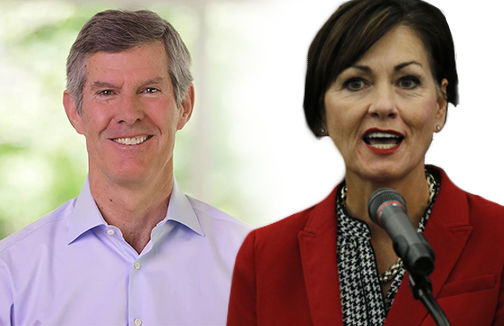Gubernatorial candidates go head-to-head at second debate

Kim Reynolds and Fred Hubbell are facing off in the 2018 midterm gubernatorial election.
October 17, 2018
Taxes, education and Medicaid privatization were main points of debate for gubernatorial candidates Fred Hubbell and Kim Reynolds Wednesday.
Hubbell, a Democrat and fifth-generation Iowan, opened with a focus on ending Medicaid privatization, funding education and increasing wages, presenting himself as the candidate of change.
“I love this state and am running for governor to change its direction by putting people first,” Hubbell said.
Reynolds, the incumbent Republican governor and first female governor of Iowa, focused on cutting taxes and expanding opportunities.
The first debate happened on Oct. 11 in Ankeny. The next debate will happen on Oct. 21 from 8 a.m. to 9 a.m. in Davenport.
Taxes
In addition to tax cuts that passed the state Legislature earlier this year, Reynolds said she would look to lowering the corporate tax rate next, as it is “one of the highest rates in the country.”
She said Iowa would be able to do all this and still maintain its priorities on education, healthcare and public safety.
Yet Hubbell said the recent tax cuts have caused unpredictability in the marketplace that families and businesses are looking for.
“The economy is like a yo-yo,” Hubbell said.
While Reynolds said she was proud there was a $127 million surplus in the budget this year, Hubbell said this is compared to nearly $900 million in the surplus a few years ago. Hubbell also attributed the current surplus to midyear cuts and borrowing he called irresponsible.
Hubbell finished by saying he would review all of the previous cuts, calculate the budget impact of tariffs and try to make responsible tax breaks for the lower and middle class.
Reynolds said her tax cuts have worked to make the state reserves full while solving fiscal management issues since she and Branstad took office in 2010.
“I want to reduce taxes, he wants to raise them,” Reynolds said. “ He has made that very clear.”
Hubbell responded to this by saying many Iowans, 40 percent, work and still struggle to afford basic necessities. He said this is due, in part, to tax cuts that have primarily benefited larger corporations at the expense of small businesses, and “to wealthy individuals at the expense of everyone else.”
Medicaid privatization
Calling Medicaid privatization a “disaster,” Hubbell said he would work to move control of Medicaid into the states hand if he were to take office.
Reynolds said the privatization was the right decision as the previous system was “not sustainable.” She also committed to changing the current system to make progress and ensure more people get the care they need.
Some of these changes have already happened: Reynolds said she put new people in charge of the management, hired a new actuary and funded the system further.
Hubbell responded to these claims by saying Reynolds does not want change.
“It wasn’t very long ago — just a couple of weeks — that she fired a gentleman, a lifelong Republican appointed by Governor Branstad to the Medicaid advisory committee, because he was raising his hand, talking about all of the permanently impaired Iowans that are being harmed by Medicaid privatization,” Hubbell said
Reynolds said Medicaid was not about politics or taking advantage of people, but rather about ensuring there is a sustainable system.
“I am not sure you have told us how you are going to pay for what you do,” Reynolds said.
Tax credits
As one of Hubbell’s budget solutions, he has said he would support reviewing tax credits that unnecessarily give breaks for the wealthy.
This position brought him under fire from Reynolds on multiple occasions as she said he and his family had taken advantage of tax credits he opposes. Calling Hubbell a “hypocrite,” Reynolds argued her opponent was being disingenuous and lacked a clear message.
Hubbell disagreed, saying there had been no foul play in the past as he had gone through all of the proper procedures when he was in charge of a tax credit review board.
He pointed to his record and said he had cut many tax credits aimed at wealthy individuals and that he would do so again. He then criticized Reynolds use of tax credits for big businesses like Apple, which he said he would cut.
Reynolds said she has been making the tax code competitive and supportive of businesses, jobs and investment.
In Hubbell’s experience, he said providing tax breaks is not how a state becomes competitive. Rather, Hubbell said the best way to make a state competitive is by having a better quality of life and educated workforce.
Education
Reynolds said she is proud of the investment the state has made into education, but said the state can’t measure its success in education based purely in the amount invested and should instead look to how well the state is preparing students for future jobs.
To this, Reynolds said she has been able to support initiatives to accomplish student preparedness.
Hubbell said our current investment in schools has led people to say they are less proud in Iowa’s schools.
“It’s not a priority by saying it’s a priority, its a priority by putting the budget dollars behind it,” Hubbell said.
Over the last seven years, Hubbell said investment has increased an average of 1.3 percent annually — lower than what has been requested by school districts.
Reynolds responded to this saying the state has created opportunities for high schoolers. Hubbell said these opportunities matter less if students can’t afford to go to college as tuition costs increase.















